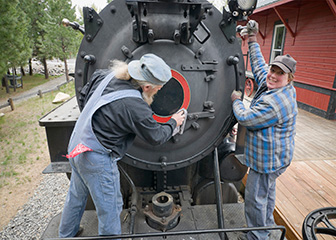Heavy Vehicle or Mobile Equipment Service Technician
Heavy Vehicle or Mobile Equipment Service Technician
Does this career fit your work personality?
Begin The Career Assessment Test- Best Fitting Careers
- Work Personality Strengths
- Work Style Preferences
- and more
Job Outlook
Overall employment of heavy vehicle and mobile equipment service technicians is projected to grow 6 percent from 2022 to 2032, faster than the average for all occupations.
About 21,100 openings for heavy vehicle and mobile equipment service technicians are projected each year, on average, over the decade. Many of those openings are expected to result from the need to replace workers who transfer to different occupations or exit the labor force, such as to retire.
What Heavy Vehicle and Mobile Equipment Service Technicians Do
Heavy vehicle and mobile equipment service technicians, also called mechanics, inspect, maintain, and repair vehicles and machinery used in construction, farming, rail transportation, and other industries.
Duties
Heavy vehicle and mobile equipment service technicians typically do the following:
- Consult equipment operating manuals, blueprints, and drawings
- Perform scheduled maintenance, such as cleaning and lubricating parts
- Diagnose and identify malfunctions, using computerized tools and equipment
- Inspect, repair, and replace defective or worn parts, such as bearings, pistons, and gears
- Overhaul and test major components, such as engines, hydraulic systems, and electrical systems
- Disassemble and reassemble heavy equipment and components
- Travel to worksites to repair large equipment, such as cranes
- Maintain logs of equipment condition and work performed
Heavy vehicles and mobile equipment are critical to many industrial activities, including construction and railroad transportation. Various types of equipment, such as tractors, cranes, and bulldozers, are used to haul materials, till land, lift beams, and dig earth to pave the way for development and construction.
Heavy vehicle and mobile equipment service technicians repair and maintain engines, hydraulic systems, transmissions, and electrical systems of agricultural, industrial, construction, and rail equipment. They ensure the performance and safety of fuel lines, brakes, and other systems.
These service technicians use diagnostic computers and equipment to identify problems and make adjustments or repairs. For example, they may use an oscilloscope to observe the signals produced by electronic components. Service technicians also use many different power and machine tools, including pneumatic wrenches, lathes, and welding equipment. A pneumatic tool, such as an impact wrench, is a tool powered by compressed air.
Service technicians also use many different hand tools, such as screwdrivers, pliers, and wrenches, to work on small parts and in hard-to-reach areas. They generally purchase these tools over the course of their careers, often investing thousands of dollars in their inventory.
After identifying malfunctioning equipment, service technicians repair, replace, and recalibrate components such as hydraulic pumps and spark plugs. Doing this may involve disassembling and reassembling major equipment or making adjustments through an onboard computer program.
The following are examples of types of heavy vehicle and mobile equipment service technicians:
Farm equipment mechanics and service technicians service and repair farm equipment, such as tractors and harvesters. They also work on smaller consumer-grade lawn and garden tractors. Most work for dealer repair shops, where farmers increasingly send their equipment for maintenance.
Mobile heavy equipment mechanics repair and maintain construction and surface mining equipment, such as bulldozers, cranes, graders, and excavators. Most work for governments, equipment rental and leasing shops, and large construction and mining companies.
Rail car repairers specialize in servicing railroad locomotives, subway cars, and other rolling stock. They usually work for railroads, public and private transit companies, and railcar manufacturers.
Mechanics who work primarily on automobiles are described in the profile on automotive service technicians and mechanics.
Mechanics who work primarily on large trucks and buses are described in the profile on diesel service technicians and mechanics.
Mechanics who work primarily on motorboats, motorcycles, and small all-terrain vehicles are described in the profile on small engine mechanics.

Work Environment

Heavy vehicle and mobile equipment service technicians held about 234,800 jobs in 2022. Employment in the detailed occupations that make up heavy vehicle and mobile equipment service technicians was distributed as follows:
| Mobile heavy equipment mechanics, except engines | 169,100 |
| Farm equipment mechanics and service technicians | 45,600 |
| Rail car repairers | 20,100 |
The largest employers of heavy vehicle and mobile equipment service technicians were as follows:
| Farm and garden machinery and equipment merchant wholesalers | 10% |
| Transportation and warehousing | 9 |
| Government | 8 |
| Heavy and civil engineering construction | 8 |
| Rental and leasing services | 7 |
Although many service technicians work indoors in repair shops, some service technicians travel to worksites to make repairs because it is often too expensive to transport heavy or mobile equipment to a shop. Generally, more experienced service technicians specialize in field service. These workers drive trucks that are specially equipped with replacement parts and tools, and they spend considerable time outdoors and often drive long distances.
Heavy vehicle and mobile equipment service technicians frequently lift heavy parts and tools, handle greasy and dirty equipment, and stand or lie in awkward positions.
Injuries and Illnesses
Farm equipment mechanics and service technicians have one of the highest rates of injuries and illnesses of all occupations. Farm equipment mechanics and service techs frequently work with heavy parts and tools. Common workplace injuries include small cuts, sprains, and bruises
Work Schedules
Most heavy vehicle and mobile equipment service technicians work full time, and many work evenings or weekends. Overtime is common.
Farm equipment mechanics’ work varies by time of the year. During busy planting and harvesting seasons, for example, mechanics often work six or seven 12-hour days per week. In the winter months, however, they may work less than full time.
Getting Started
How to Become a Heavy Vehicle or Mobile Equipment Service Technician

Most heavy vehicle and mobile equipment service technicians have a high school diploma or equivalent. Because vehicle and equipment technology is increasingly sophisticated and computerized, some employers prefer to hire service technicians who have completed a formal training program at a postsecondary institution.
Education
Most heavy vehicle and mobile equipment service technicians have a high school diploma or equivalent. High school courses in automotive repair, electronics, physics, and welding provide a strong foundation for a service technician’s career. However, high school graduates often need further training to become fully qualified.
Completing a vocational or other postsecondary training program in diesel technology or heavy equipment mechanics is increasingly considered the best preparation for some entry-level positions. Offered by vocational schools and community colleges, these programs cover the basics of diagnostic techniques, electronics, and other related subjects. Each program may last 1 to 2 years and lead to a certificate of completion. Other programs, which lead to associate’s degrees, generally take 2 years to complete.
Training
Entry-level workers with no formal background in heavy vehicle repair often receive a few months of on-the-job training before they begin performing routine service tasks and making minor repairs. Trainees advance to more complex work as they show competence, and they usually become fully qualified after 3 to 4 years of work.
Service technicians who have completed a postsecondary training program in diesel technology or heavy equipment mechanics typically require less on-the-job training.
Many employers send new service technicians to training sessions conducted by equipment manufacturers. Training sessions may focus on particular components and technologies or particular types of equipment.
Licenses, Certifications, and Registrations
Some manufacturers offer certification in specific repair methods or equipment. Although not required, certification can demonstrate a service technician’s competence and usually commands higher pay.
Contacts for More Information
For more details about job openings for heavy vehicle and mobile equipment service technicians, consult local heavy and mobile equipment dealers and distributors, construction contractors, and government agencies. Local offices of the state employment service also may have information on job openings and training programs.
For more information about careers and training programs, visit
Associated Equipment Distributors
Similar Occupations
This table shows a list of occupations with job duties that are similar to those of heavy vehicle and mobile equipment service technicians.
| Occupation | Job Duties | Entry-Level Education | Median Annual Pay, May 2022 | |
|---|---|---|---|---|

|
Aircraft and Avionics Equipment Mechanics and Technicians |
Aircraft and avionics equipment mechanics and technicians repair and perform scheduled maintenance on aircraft. |
See How to Become One | $70,740 |

|
Automotive Body and Glass Repairers |
Automotive body and glass repairers restore, refinish, and replace vehicle bodies and frames, windshields, and window glass. |
High school diploma or equivalent | $47,270 |

|
Automotive Service Technicians and Mechanics |
Automotive service technicians and mechanics inspect, maintain, and repair cars and light trucks. |
Postsecondary nondegree award | $46,970 |

|
Diesel Service Technicians and Mechanics |
Diesel service technicians and mechanics inspect, repair, and overhaul buses, trucks, or any vehicle with a diesel engine. |
High school diploma or equivalent | $54,360 |

|
Industrial Machinery Mechanics, Machinery Maintenance Workers, and Millwrights |
Industrial machinery mechanics, machinery maintenance workers, and millwrights install, maintain, and repair factory equipment and other industrial machinery. |
High school diploma or equivalent | $59,470 |

|
Small Engine Mechanics |
Small engine mechanics inspect, service, and repair motorized power equipment. |
See How to Become One | $44,080 |

|
Water Transportation Workers |
Water transportation workers operate and maintain vessels that take cargo and people over water. |
See How to Become One | $66,100 |
